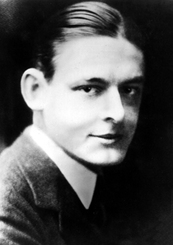
The alum was right, of course. Eliot’s impersonal style doesn't resonate with readers and poets now the way it once did. Though I'm a huge fan, that aspect of his work doesn't appeal to me much either. When I was learning the craft of poetry, Eliot was, at one point, a major influence (he still is). Even then, I cherry-picked his "bag of tricks," scrutinizing his line breaks, use of meter and musicality and leaving behind his impersonality.
I think Eliot would have approved of the way in which I stole from him. As he put it, "Immature poets imitate; mature poets steal; bad poets deface what they take, and good poets make it into something better, or at least something different. The good poet welds his theft into a whole of feeling which is unique, utterly different from that from which it was torn; the bad poet throws it into something which has no cohesion. A good poet will usually borrow from authors remote in time, or alien in language, or diverse in interest. Chapman borrowed from Seneca; Shakespeare and Webster from Montaigne. The two great followers of Shakespeare, Webster and Tourneur, in their mature work do not borrow from him; he is too close to them to be of use to them in this way."
To return to Eliot's loss of vogue, he is not alone. What happened to him has happened to many a poet and writer. Those talented and lucky enough to be canonized still suffer the vicissitudes of literary taste. Usually, anyway. But I'm sure interest in Eliot will resurge one of these days. Even if his impersonal style never catches on again, readers and poets will again, in droves, find something in his work worth contemplating.
His talent and achievements are too large for it to be otherwise.
*Below are the lines in which Eliot describes the events that preceded and followed the Crucifixion. This passage is from The Waste Land:
After the torchlight red on sweaty faces
After the frosty silence in the gardens
After the agony in stony places
The shouting and the crying
Prison and palace and reverberation
Of thunder of spring over distant mountains
He who was living is now dead
We who were living are now dying
With a little patience
 RSS Feed
RSS Feed